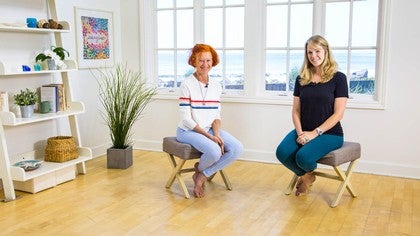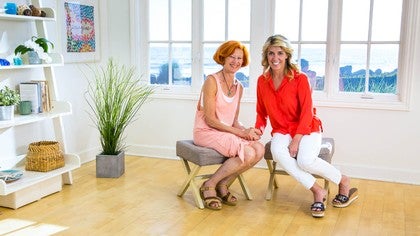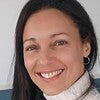Read Full Transcript
I'm very excited to have Kim Shelton here today for an interview. And Kim is a very unusual example of someone who took very, very little information and is running with it. In fact, Kim is only educated in beginner mat and really there's very few people that know how much little and how powerful a small amount of information can be. So our, the name of Your Business, Kim, which is a clue my business name is mommy's strength within. So what inspired you to call Your Business? This, I had a very difficult recovery after breathing two huge babies back to back. And um, and so I learned that it was really important to find my own strength that like I couldn't just rely on somebody else to give me strength or to, to, um, give me power that I needed to find that own strength within me.
And I wanted to bring that to other women. That they have their own power and their own strength within them as well. And to draw it out of them. That's wonderful. Because what was your inspiration to become a teacher? So, um, as I said, I had two very large babies back to back and they, my body was pretty torn apart afterwards.
And so after about a year of physical therapy, a along with [inaudible] classes, I um, was able to restore my own strength and um, and decided that I just, I wanted to be able to bring this to other women who weren't able to necessarily get to a physical therapist, but that needed the help. They needed someone there to guide them. So that's why I started as this. So as you know, she was, Kim here was quite clear about the type of people she wanted to work with. In fact, you've shared with me that you work with perinatal women. So what does that actually mean?
So perinatal and in my definition includes anyone who has ever held a baby within their body. So that would be from the woman who is brand new, pregnant, all the way through until their end of life. Okay. And what are you addressing because he has a very specific angle in her focus as a teacher, what sort of problems or issues are you focusing in on when you work with your clients, with new clients who have any kind of injury from birth or from pregnancy? Then? A big thing that I'm looking for is diastisis Rekti. Um, another thing that I'm looking for is pelvic floor issues. Um, I, I will almost always refer clients to a women's health physical therapist to go just get checked out, make sure everything's okay. Um, and sometimes my clients are able to do that and sometimes they're not able to. So then it's a matter of just being very cautious about how we proceed and making sure that, that, that we are able to help them to close those, recover from those injuries. So as I know you're inspired from your own personal journey, what was your, oh, how can I put it? Injury. I mean, you have opened my eyes into how complicated birth can be and the fact that women can actually be heavily traumatized maybe for the rest of their life from this.
So what was your experience and how do you see what you do addressing this? Um, so I had, I had two large babies back to back and um, within within 17 months I had two 10 pound babies. Wow. Um, and so I had a very large, uh, six finger diastisis and um, which is a very large separation of the abdominals. And so I wasn't able to go to physical therapy until I was 14 months postpartum from my second child. And as I was going through physical therapy, I also, I realized that what they were doing was [inaudible]. And so, um, I started taking a mat class with you during that time. And um, and one day I was talking with my physical therapist and said, I love what you do, but it's just not accessible for so many women.
For the first 14 months after my daughter was born, I wasn't able to get here. So how, how can we make this more accessible to women who really need this service, but they can't get out of the house. They, they can't even take a shower, but much less be able to take an hour and a half or two hours off every week to go see a PT. How can we make this more accessible to them? And so, um, I, I was able to heal myself. I now have no separation and um, and I, and I designed this business to be able to be that too, to connect those dots to be that person that brings this service to the clients. How do you do that? I go to their homes. I serve all of my clients in their homes and um, and I work, you know, we just make it work in the environment that they're in.
They're usually children climbing all over us and I babysit while also entertaining the kids while also trying to keep mom focused on what she's doing, what her exercises are, and helping her to remember her breath and remember to stay focused and remember to engage. And it's kind of a circus, but it's, it's fun. I love this. I have to say like who would think of, Hey, I remember you telling me I'm going to go and hold the baby so the mom can get on the floor and actually pull her stomach muscles. And because she for sure is not leaving the house. And one of the things that struck me there was really opened my eyes wide because not a mom. So I don't, I've never dealt with this in my own personal life. How isolated you are. First of all, if you've had c-section, you may not even be able to lift up the baby. The husband's at work, you're in severe pain, you probably depressed, traumatized, you have no manual and you're alone and nobody cares because they're assuming you're together and everything's fine. The baby was born.
So it's this incredibly vulnerable point in women's lives that heck I didn't really know about until you started talking to me about it. And now every time I'm having a, somebody, a client or friend who's pregnant, I'm like, what are you going through? So it was really brilliant. And your vision was and is such an inspiration and I know you struggled with a sense of inadequacy as a UN being under-qualified, this idea that you needed to be with qualifications and certificates and a body of knowledge. And I know you did some research, so to be honest, what did you find out two years ago? I didn't have any idea what Palladio's was. I had never taken a [inaudible] class and now I am coming up on my one year anniversary of teaching. So I have had to very quickly learn a lot of information. But um, a lot of it honestly came kind of innately because I was drawing on my own experience of what I had been through and also from, I did almost a full year of physical therapy. So the whole time I was receiving I just want to qualify the receive physical therapy.
You didn't study physical therapy? Yes. Can. Um, and so I took careful notes when I was doing it and I've met with that physical therapist several times afterward to try to like ask questions to ask followup questions. Am I doing this right? Am I, is this right? I also, um, before I received my actual certification, I traveled up to Portland and took a class from, um, from Wendy foster with Mama Lottie's. And, uh, I just was trying to like learn everything that I could about what is going on in this community. And so that's from there. I've just kind of made it up on my own. Well, I have to say, I encourage you in doing that, it takes a lot of courage to be honest. That's how all knowledge comes to pass because we sometimes accidentally stumble, stumble onto the fact that there is no knowledge out there.
There's no community, there's no university course or manual or book. And it's an unspoken area of great, great need. And I am so proud of you and excited for you that you had this creative willingness to step into all of this. How many clients do you have and where do you find your clients? I mean, pregnant women, nowhere to be seen.
Um, except for it parks. So I find, I find a lot of my clients, um, just hanging out with my kids, we go to the park pretty much every day or at preschool, um, in grocery stores that are at church in different areas where I'm around other moms and their kids. And um, and so then we just start talking. I'm a pretty social person and for some reason people tend to be drawn to me and open up. And you would be surprised, surprised at how often women in the very first time talking with someone new, they'll start talking about how they still struggle with running and not peeing and um, and other issues that are so closely related to what they experienced when they were pregnant or postpartum. And so, um, I had just given my card and let them know what I do and, and then they follow up. I love this, I mean, talk about innate marketing, just being available with in the park with your kids. So when you're working with clients and you're going to their home and whatever environment you are in, and I'm sure each client is very unique in their set up. Is there anything you're finding out or addressing or discovering that there is a requirement for what's it [inaudible]?
Absolutely. Um, so during those first few sessions, it's um, really important for me to build rapport with them because when, especially when you're first, first starting to see someone and you're in this very vulnerable place where you've had a baby and you feel like your life is kind of in pieces and you're a mess, then, um, a big thing for me to watch out for is any sort of mood disorders. So I'm, I come from a background of counseling I have, I have a master's in counseling. And so that's something that I'm always kind of like checking for is is there any kind of postpartum depression, any kind of postpartum anxiety? I'm OCD that's happening here. And if there is, I love to think that I'm one of the first kind of lines of defense that maybe the husband or the family isn't really, isn't really seeing it or they don't know what's normal with a mom who just had a baby. And so I can kind of be that check-in that like, Hey, are you okay? Are you sure you're okay? And if you're not, let's talk about what resources or what, what community is around you to help support you and make sure that this is going as best as it can.
Brilliant. Just brilliant. Oh my goodness. Is this a lot more than just teaching math? [inaudible] this is really, really providing a much needed service. And I know you're married and you have two little kids. How old are your kids? My daughters are three and four. So she's still very much a mom. And how do you balance work and being a mom and family life?
I am very blessed to have an extremely supportive husband and um, and my parents are close by as well. So my parents watch the kids a lot when I'm, when I have to work, when they're not at school or otherwise I'm taking care of. So that's been a huge port part for me is that I, I knew that I needed that community around me to be able to go out and do something helpful. But to be honest, I'm a much better mom when I, when I get to go out and teach, when I get to go out and feel like I'm serving someone to like I'm helping people, that um, that I'm able to then come back to the kids and have a lot more patience with them. And what I love about this, you actually very young modeling success modeling independence, modeling what it's like to have a good, meaningful life, a life that feeds you as much as you feed it. And we are all diverse, diverse examples and we influence our kids by how we are.
They grow up to have us as their first reference points. Yeah. I love to think that my girls are learning from me. We talk about that a lot. That they'll say, mommy, we don't want you to go see your clients. We don't want you to leave us. And I'll say, but mommy has to go because mommy needs to help other people. And that's, that's part of the journey is that we want to go out and we want to help other people. So this is how I'm doing it. How can you guys go do it too? How can you help other kids that you see?
I love that. That's really, really brilliant. So there is a future ahead. What and how do you envision your future? Where do you want to go with all of this? That's okay. Good question. I, so I named my business mommy's strength within, because I didn't, I didn't want to call it just Kim's [inaudible] or plots for mommies or something like that because I wanted to be able to add to it.
So I would love to, in the future, maybe provide doula services, especially postpartum doula services, um, and possibly lactation consulting or something else. I haven't totally figured out how I want it to, to look. And that's okay. Cause it's not my plan. It's God's plan, but it'll all just kind of come together. It, everything has come together so far and I haven't had anything to do with it. So I just wait for other people to tell me what, what they see. And I go from there. I'm happy to take cues.
I love what you're saying because you have your ears wide open for the need. In a sense, you're hearing people talking about problems and you see instantly where that can go. So as a final question, if there was a billboard of where you could post three tips for beginning teachers suggestions for them as guidelines, what would these three tips be? Be Passionate. Um, have compassion for your clients and yourself and, and give everyone grace. It's okay to not be [inaudible]. Perfect. I love that. I want that billboard in my room. So Kim, thank you so much for coming. You're such an inspiration. You're so unique. I mean, yes, you rock it. And boy, I wish I was pregnant to Sab.
You come and take care of me and my kids. So all the best to you. Thank you very much.















